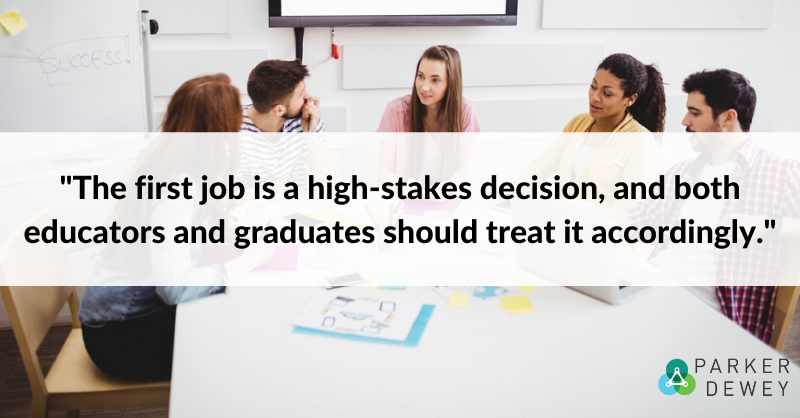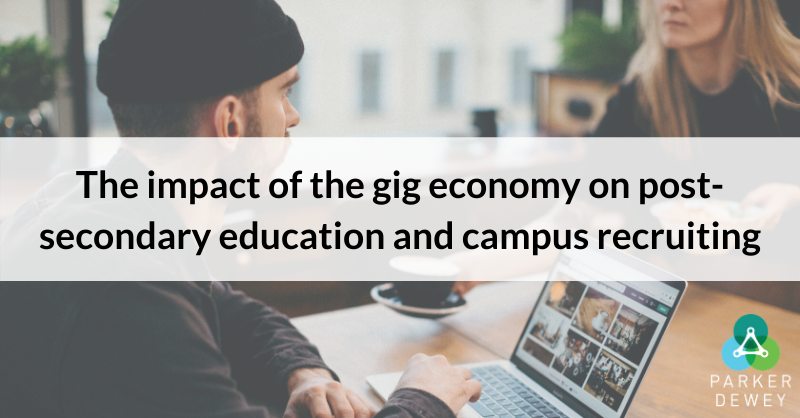
Strategies to Overcome Underemployment of College Graduates
The new report from Strada Institute for the Future of Work and Burning Glass Technologies, The Permanent Detour: Underemployment’s Long-term Effects on the Careers of College Graduates, is a must-read for anyone interested in college-to-career transitions.
This eye-opening report shines a light on the importance of the first job after college graduation, and how those that start out behind are five times more likely to remain behind five years later.
"The first job is a high-stakes decision, and both educators and graduates should treat it accordingly."
Based on the findings, we’ve highlighted four strategies that can be used to help solve this problem for all of the stakeholders: the students, employers, and colleges.
- More professional experiences throughout college. For students, it is important to not wait until junior or senior year to engage in career preparation. Working on professional projects that allow students to utilize the research, writing, and problem solving skills developed in the classroom help connect coursework to career outcomes. And, it should be noted, that these skills are honed in all classes, not just those with names that sound like job titles. In addition, early experiences offer a chance for students and employers to start building authentic relationships rather than relying on a rushed, artificial recruiting process to find / fill limited internship and job openings.
- Better mentoring. Alumni are eager to engage with current students, but often struggle to commit to ongoing engagements. To ease scheduling conflicts, colleges can help connect students and alumni through guest lectures and speaking engagements. Moreover, opportunities to work on professional assignments alongside alumni can also help build more authentic student-employer relationships as students complete projects for alumni, or seek their counsel on projects being completed for others. Plus, these conversations are much more interesting to alumni (and useful to students) than "Tell me about a typical day."
-
Recognize benefits of career exploration. There is a massive benefit to career exploration so that college grads can find the right role. Should we really expect a college student with only an internship or two (best case) to understand what industry, role, company size... aligns with their professional interests? For employers, career exploration also offers benefits, as it provides new hires with the context to better assess both skills and fit. Unfortunately, most of this exploration takes place after college graduation as evidenced by the job hopping dilemma, the result of which hurts Career Launchers and companies alike. Instead, students, employers, and colleges can work together to provide opportunities for career exploration as early as freshman year so that the first job post-graduation effectively positions the Career Launcher on his or her professional pathway, and does not lead to immediate (and long term) underemployment.
-
Look beyond school, major, and GPA. Applicant tracking systems help corporate recruiters filter out candidates that don’t possess the “ideal” background (which really means GPA, major, school, and keywords), but that filtering has a negative impact on a businesses' diversity, retention, employee satisfaction, and overall performance. Furthermore, recent talent-gap data points not to technology skills, but a lack of core skills including research, communication, and problem solving, none of which are effectively measured by an ATS.
One of the most effective ways to execute all of these strategies is to provide more opportunities for college students to demonstrate their skills to employers in a practical setting. Companies have recognized this for decades, which is why internships and co-op programs lead to better hiring outcomes. However, with increasing acceptance of freelance models and the "gig economy," companies are now moving beyond the constraints and commitments associated with these programs. Through efforts such as Micro-Internships, on-campus consulting engagements, and other experiential opportunities, companies are improving hiring outcomes, getting immediate support from highly motivated college students, and helping ensure that high caliber college graduates don't get stuck in the underemployment quagmire.




